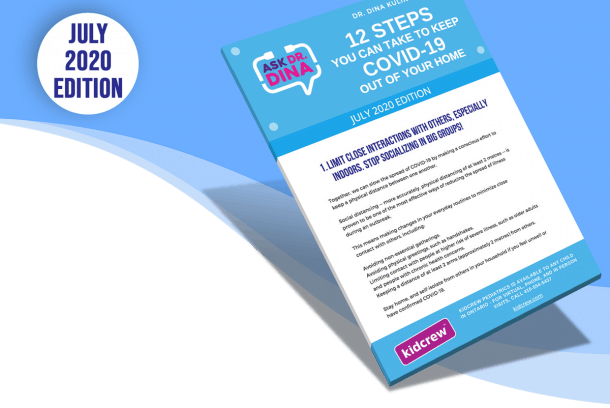Twelve Steps You Can Take to Keep COVID-19 Out of Your Home
This is an unprecedented time in world history.
Not in our lifetime have we seen the entire world facing the same grim reality: we have a big, bad, life-threatening illness in our backyard. In backyards across the world: East, West, North South. Everywhere! (Except Antarctica, as of April 4, 2020).
But we have ways to prevent it from affecting us, our families, and the people that we love.
We know how to minimize the risk of getting sick. No, it isn’t a magic vaccine (at least not yet). It is not that easy; I wish it was, as more people would be willing to get a vaccine. The current preventative measures are tougher, but effective.
My secret sauce to prevent COVID-19 stems from a simple thought: I want you to imagine that every single person that you come in contact with, and every single surface that you touch, has COVID-19 on it. Every person and every surface.
You know when you get a birthday card, and the card has sparkles on it, and for weeks you find sparkles in your hair… your fingers… all over your house? Well, that is COVID-19.
COVID is a sneaky bugger, and it lingers on everything, for hours to days.
You can protect yourself and help prevent spreading the virus to others!
1. Stop being with other people! Stop socializing. Stop moving around your community. Just stop.
Together, we can slow the spread of COVID-19 by making a conscious effort to keep a physical distance between one another. Social distancing—more accurately, physical distancing of at least 2 metres—is proven to be one of the most effective ways of reducing the spread of illness during an outbreak.
This means making changes in your everyday routines to minimize close contact with others, including:
• Avoiding non-essential gatherings
• Avoiding physical greetings, such as handshakes
• Limiting contact with people at higher risk of severe illness, such as older adults and people with chronic health concerns
• Keeping a distance of at least 2 arms (approximately 2 metres) from others
• Stay home, and self-isolate from others in your household if you feel unwell or have confirmed COVID-19.
2. Meticulous hand hygiene
Proper hand hygiene can reduce the risk of becoming infected with COVID-19 or spreading infection to others:
• Wash your hands often, with soap and water, for at least 20 seconds (especially after using the washroom and when preparing food).
o Use an alcohol-based hand sanitizer if soap and water are not available.
• When coughing or sneezing:
o Cough or sneeze into a tissue or into your inner elbow, not your hand.
o Dispose of any tissues you have used as soon as possible, into a lined garbage basket, and wash your hands afterwards for at least 20 seconds.
• Avoid touching your eyes, nose, or mouth with unwashed hands.
3. Cleaning well
Health Canada and the CDC have published a list of hard surface disinfectants that are likely to kill COVID-19.
We recommend regularly cleaning, with either regular household cleaners or diluted bleach (1-part bleach to 9 parts water, or 1 cup to 1 gallon of water), the following surfaces:
• Toys
• Phones and other electronics, remotes
• Toilets and toilet handles
• Door handles
• Bedside tables
• All kitchen and bathroom surfaces
FOR ALL TWELVE STEPS, DOWNLOAD OUR GUIDE
FOR MORE INFORMATION
For reliable, up-to-date information on the COVID-19 outbreak, I recommend the following:
1. The World Health Organizations COVID-19 Coronavirus Information Page
2. The CDC COVID-19 Coronavirus Information Page
3. Health Canada’s COVID-19 Coronavirus Information Page
SELF-ASSESSMENT
If you think that you might have COVID-19, you can complete a COVID-19 self-assessment:
If you or your child screens positive here, it is critical that you call 1-866-553-7205 to be screened and verify if you should attend an assessment center or self-isolate at home for 14 days.
There’s another dangerous VIRUS and it’s in your backyard.
READ MORE
As with all illnesses, if you are worried about your symptoms, you should see a healthcare provider.











